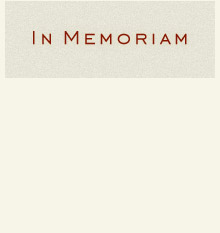Emdashes—Modern Times Between the Lines
The Basics:
About Emdashes | Email us
Ask the Librarians
Best of Emdashes: Hit Parade
A Web Comic: The Wavy Rule
Features & Columns:
Headline Shooter
On the Spot
Looked Into
Sempé Fi: Cover Art

Martin Schneider writes:
I've always liked Sidney Lumet's movies, and I've always liked the idea of Sidney Lumet's movies, the elevation of sheer storytelling craft over self-indulgent personal expression. Lumet had plenty to express, all right, but he did it with a minimum of fuss and always with his full attention on entertaining the viewer in an intelligent way.
One of the nice things about a career that is so long and varied and apparently free of auteurist mannerisms is that every fan will have a different collection of favorites. Some champion Network; give me The Morning After instead. You like Equus? I'll take Murder on the Orient Express. Oh, you want Before the Devil Knows You're Dead? I'm happy with Prince of the City. And I've left out at least ten pieces of compulsively watchable Hollywood product.
He had his turkeys, and he had his hits. He made a lot of movies, and most of them were darn good. I think someone once called him the greatest hack director who ever lived; I think he would have understood the profound compliment implied therein.
PS: For more on Lumet, the comments in this ArtsBeat post are uniformly wonderful.
Leo Cullum, 1942-2010
Filed under: In Memoriam Tagged: Bob Mankoff, Cartoon Bank, cartoons, in memoriam, Leo Cullum

Emily Gordon writes:
We were very sad to hear the news of the death of New Yorker cartoonist and veteran airline pilot Leo Cullum. (Click his name to see the full archive of his wonderful cartoons for the magazine.) From the New York Times obituary:Mr. Cullum, a TWA pilot for more than 30 years, was a classic gag cartoonist whose visual absurdities were underlined, in most cases, by a caption reeled in from deep left field. “I love the convenience, but the roaming charges are killing me,” a buffalo says, holding a cellphone up to its ear. “Your red and white blood cells are normal,” a doctor tells his patient. “I’m worried about your rosé cells.”Here’s the full obituary, and we’ll add other stories throughout the week.Mr. Cullum seemed to have a particular affinity for the animal kingdom. His comic sympathies extended well beyond dogs, cats and mice to embrace birds — “When I first met your mother, she was bathed in moonlight,” a father owl tells his children — and even extended to the humbler representatives of the fish family. “Some will love you, son, and some will hate you,” an anchovy tells his child. “It’s always been that way with anchovies.”
“There are many ways for a cartoon to be great, not the least of which is to be funny, and Leo was one of the most consistently funny cartoonists we ever had,” said Robert Mankoff, the cartoon editor of The New Yorker. “He was certainly one of the most popular — some of his cartoons were reprinted thousands of times.”
Our condolences to Mr. Cullum’s family and friends, including the many New Yorker cartoonists who knew and loved him. Here’s the post reporting the news at the magazine’s own Cartoon Bank.
Later: Here’s the Comics Reporter on Cullum and his career. (continued)
Paul Conrad, 1924-2010
Filed under: In Memoriam Tagged: Bill Clinton, cartoonists, cartoons, comics, Frida Kahlo, George Bush, Jimmy Carter, Marcel Duchamp, Pablo Picasso, Paul Conrad, Pollux, Richard Nixon, Ronald Regean, Ross Perot, Salvador DalÃ

Pollux writes:
One of the many books on my parents’ bookshelves was a volume of Paul Conrad’s collected work. Conrad’s book, which, to me, had always graced these shelves, stood amongst volumes on other artistic greats: Duchamp, DalÃ, Kahlo, Picasso. Conrad belonged there.
Conrad’s sharp and funny cartoons were both an inspiration and an historical record of several decades of American history, unflinchingly showing us at our worst. His drawings for The Los Angeles Times earned Conrad the enmity of Nixon and Nancy Reagan, as well as the Pulitzer Prize (three times). Conrad didn’t pull any punches.
(continued)Harvey Pekar, 1939-2010
Filed under: In Memoriam Tagged: American Splendor, cartoonists, Cleveland, comics, David Letterman, Green Lantern, Harvey Pekar, In Memoriam, Kryptonite, Pollux, Robert Crumb, Superman

Pollux writes:
“Some reviewers in Tucson and Kansas City, if they talk about American Splendor at [all,] are gonna say stuff like, ‘This is a comic book? Then why ain’t I laughin’?’ I know that, I’m ready for it.”
These are words spoken by Harvey Pekar in The New American Splendor Anthology (1991), or rather “Harvey Pekar,” the persona who inhabited volumes of comics. As figures and scenes from the Bible were rendered again and again by countless medieval and Renaissance artists, so Pekar was depicted by various comic illustrators, Robert Crumb not the least among them.
(continued)Gary Coleman, 1968-2010
Filed under: In Memoriam Tagged: Culver City, Gary Coleman, In Memoriam, Los Angeles, Pollux, television, Tom Bradley

Pollux writes:
“Why should I be afraid of the camera?” Gary Coleman asked, in an April 1979 interview in Ebony Jr. magazine (Vol. 6, No. 10). “If it wore a black cape and had fangs, I’d be scared of it. But since it doesn’t, then why be afraid? There’s really nothing to this.” Coleman was eleven at the time. Diff’rent Strokes, of which Coleman was the life and soul, had already been on the air for four months.
By the time Coleman celebrated his 21st birthday, the actor had attempted to take control of his life, and his finances, by suing his parents and former manager for mismanaging his $3.8 million trust fund. His life had become a mixture of misfortune and success. Celebrities attended the actor’s 21st birthday. The mayor of Los Angeles, Tom Bradley, declared February 8 to be “Gary Coleman Day.” Coleman cut into an enormous birthday cake shaped like a train (the actor was a model train aficionado).
(continued)
















